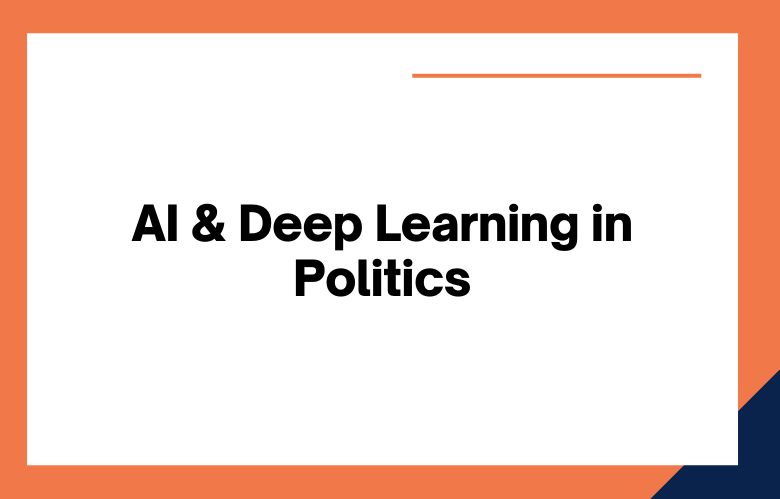Deep Learning Predictions: Political campaigns are increasingly turning to AI and deep learning technologies to help them target voters and predict election outcomes. In this blog post, we’ll look at how AI and deep Learning are used in political campaigns and make predictions about how these technologies will develop.
In recent years, we’ve seen a lot of tremendous advances in the field of artificial intelligence (AI). Deep Learning, in particular, has led to incredible breakthroughs in image recognition, natural language processing, and predictive analytics.
Now, it looks like AI is about to change the world of political campaigning. Thanks to deep Learning, we can now make much more accurate predictions about how people will vote and what issues they care about. This could transform campaigns, making them far more targeted and effective.
The Impact of AI on political campaigns using Deep Learning Predictions
Artificial intelligence is being implemented in several sectors, including political campaigns. This innovation has already been used to target voters and influence their behavior.
The impact of artificial intelligence on political campaigns is expected to be significant. As campaign teams collect more data, they can make better decisions and predictions about the electorate.
Artificial intelligence can be used to predict how a candidate’s message will resonate with voters. AI could also help the campaigns’ fundraising efforts by targeting potential donors based on their interests and social media data. By analyzing information, AI can make better decisions than people can. Some believe AI will predict and influence voter behavior as it becomes more powerful and advanced.
The impact of artificial intelligence in campaigns is a good thing. Without technology, political groups would spend more money on advertising and canvassing.
Deep Learning and its potential use in political campaigns
Deep knowledge has been applied to everything from online advertising to medical radiology. One area, however, remains largely untapped: political campaigns.
Most people don’t understand how deep Learning works. The good news is it will only get better as time goes on.
Political campaigns may use deep Learning to understand their electorate shortly better.
Artificial intelligence (AI) is coming to change how we perceive the world. Deep Learning shows the potential to help us make decisions, especially in politics, because it can highlight important issues relevant to voters and analyze facts more efficiently than humans.
A revolution in artificial intelligence is currently underway. As a result, political campaigns will soon be able to assess voters’ opinions better and increase their chances of winning an election.
One of the most significant political problems is that people judge candidates too quickly. Deep Learning can determine if political opinions are firm or just a reaction against something else.
How will AI and Deep Learning change the way Politicians Campaign?
It’s likely that soon, candidates will have AI bots to help them campaign. They could use the technology to gather information on potential voters and identify their concerns.
Recent advancements in AI and deep learning have made it easier for politicians to campaign more effectively than ever.
There are many ways that AI and deep learning will change how politicians campaign. For example, AI can help them understand what their voters care about most.
With the rise of AI and deep Learning, politicians can better understand their constituents. Instead of making campaign promises that they won’t be able to keep, they’ll concentrate on what people want.
Artificial intelligence and deep learning have changed the way politicians campaign. They’ve also played a role in who wins elections because AI can access vast amounts of data that humans cannot.
AI and deep Learning will analyze large amounts of data on contact with the target audience, giving politicians a better sense of what they want.
If politicians can channel the power of AI and deep Learning, they will create a more engaging campaign. They’ll use sentiment analysis to discover their constituents’ feelings and target them with specific messages.
Politicians will use AI and deep Learning to gather more voters’ and campaign experts’ data. They’ll then be able to create ads based on personal interests.
What are the benefits of using AI and deep Learning in political campaigns?
These technologies can be used to analyze data and predict the outcome of an election. This isn’t just helpful for political campaigns and understanding public opinion on specific topics and issues.
We can use AI and deep Learning to predict local voting trends with 90% accuracy. This allows us to get out the vote in swing states & win elections.
With the help of intelligent programs that analyze information and large amounts of data, a political campaign can better understand its audience’s needs. These algorithms can also gather information from social media platforms to provide more context about their target voters.
By using AI, political campaigns can better organize their efforts. This leads to more affordable and efficient ways of getting the word out about candidates or issues.
Artificial intelligence and deep Learning can be used to create better and more personalized campaign experiences for voters.
With AI, you can analyze the massive amounts of data accumulated during a campaign and predict outcomes based on this information. You can also use AI to predict voter turnout and tailor your strategy accordingly.
What challenges will be faced when implementing AI and deep Learning in political campaigns?
While AI and deep Learning might be effective in politics, they must be used responsibly. This means there will have to be regulations or laws against using them for harmful purposes such as cyber-attacks or spreading propaganda.
Many people are afraid of AI and its capabilities. However, it’s important to remember that it will not replace human intelligence or ability but rather complement them and make us smarter.
The biggest challenge for implementing AI and Deep Learning in the political field is finding a good dataset is hard.
AI and deep Learning will soon be implemented in politics to make it fairer. It should also help eliminate political corruption by preventing the election of corrupt individuals.
A significant challenge is that the political field is not one-dimensional. Many different variables are at play, and an AI would have to learn about these factors before making a decision effectively.
The main challenge would be to protect civil liberties and privacy. If a political party uses its position to spy on the opposition, this could lead to election fraud.
The biggest challenge is the political system itself, which often prevents changes from happening as quickly as they should.
There are a few unique challenges in developing AI applications for politics compared to other fields. These challenges include the need to protect personal data and privacy and be transparent about how algorithms work so people can have faith in them.
Conclusion
AI and deep Learning are poised to play a more significant role in political campaigns as we move into the future.
As technology advances, candidates must embrace and use these new tools to their advantage.
Contact us today to learn more about how AI and deep Learning can be used in your next campaign.
One way to get in touch is by filling out our online form on this site or give us a call at
+91 9848321284. Let’s work together today!
AI and Deep Learning Predictions for Political Campaigns: FAQs
What Is the Role of AI and Deep Learning in Political Campaigns?
AI and deep learning are used to analyze voter data, predict outcomes, optimize messaging, and improve strategic decisions in real time.
How Does Deep Learning Differ from Traditional Political Data Analysis?
Deep learning uses multilayered neural networks to detect complex patterns in voter behavior that traditional models often miss.
Can AI Accurately Predict Election Outcomes?
AI can forecast election trends and probable outcomes based on historical data, real-time inputs, and advanced modeling, though it is not foolproof.
How Is Voter Sentiment Measured Using Deep Learning?
AI tools process text, video, and social media content to identify emotional tone, approval levels, and voter reactions to campaign messages.
What Kind of Data Do AI Models Use in Political Forecasting?
They rely on voter rolls, polling results, demographic profiles, behavioral data, media coverage, and online engagement metrics.
How Do Political Campaigns Use Real-Time Predictions?
Campaigns adjust their strategy dynamically by tracking voter sentiment, response to messaging, and issue-based engagement in real time.
Can AI Identify Persuadable or Swing Voters?
Yes, AI classifies voters based on likelihood to switch preference or respond positively to specific messaging, aiding in targeted outreach.
Is Deep Learning Useful for Microtargeting in Politics?
Deep learning improves microtargeting by enabling highly personalized communication based on behavior, interest, and demographic segmentation.
How Can AI Help in Fundraising Efforts?
It identifies high-probability donors by analyzing past donation history, interests, and engagement patterns, and optimizes donation asks.
What Are the Risks of Using AI in Political Campaigns?
Risks include data privacy violations, algorithmic bias, voter manipulation, and lack of transparency in decision-making processes.
Can AI-Generated Insights Improve Campaign Messaging?
Yes, AI helps craft messages that resonate by analyzing audience sentiment, language preferences, and content effectiveness.
Is Deep Learning Used to Track Opponent Performance?
Campaigns can use AI to monitor competitors’ media presence, public sentiment, and messaging effectiveness for strategic advantage.
Do Small or Local Campaigns Benefit from AI Tools?
Affordable AI solutions now allow even small campaigns to perform data analysis, voter targeting, and digital engagement effectively.
What Ethical Guidelines Should Be Followed When Using AI in Politics?
Campaigns should prioritize transparency, fairness, data security, consent, and avoid discriminatory targeting or misinformation.
How Can Campaigns Ensure AI Models Are Fair and Unbiased?
By using diverse datasets, auditing regularly, involving cross-functional teams, and applying fairness metrics during model training.
What Happens If AI Predictions Are Wrong?
Miscalculations can lead to misplaced resources, ineffective messaging, and strategic setbacks, highlighting the need for human oversight.
Can Deep Learning Support Real-Time Media Response?
Yes, it enables campaigns to adapt swiftly to news events, trending topics, or public opinion shifts with timely content.
Are AI Tools Used for Voter Turnout Predictions?
Campaigns use AI to estimate who is likely to vote, when, and why, helping them prioritize get-out-the-vote efforts.
How Do Campaigns Maintain Privacy While Using AI?
They implement encryption, anonymization, legal compliance, and ethical data use practices to safeguard voter information.
What Is the Future of AI and Deep Learning in Politics?
AI is expected to become more integrated, regulation-driven, and personalized, shaping how campaigns engage with voters at scale.











